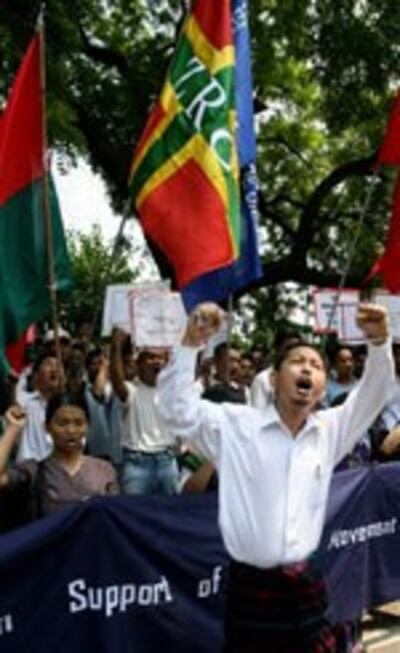
WASHINGTON—Anti-government protests in Burma are spreading outside the former capital Rangoon, with hundreds of Buddhist monks taking to the streets in the western port city of Sittwe and a leading activist fleeing to safety after government-backed thugs attacked her demonstration.
Local sources in Sittwe, in Arakan state about 310 miles (500 kms) northwest of Rangoon, said several hundred monks protested there for the first time since demonstrations erupted last week over a rise in fuel prices in the impoverished country.
“It was about at 2 p.m. [Tuesday]. They are not regular folk. All the protesters are monks,” said one local resident who asked not to be named.
“There were more than 300 Buddhist monks present,” said another, who also spoke on condition of anonymity. Other sources in Arakan said the government was pressuring monastic authorities in Sittwe to control the monks. Several monks were detained along with people who gave them drinking water, with some released later, according to local sources.
Su Su Nway, a leading activist, was meanwhile taken to an undisclosed safe place after police and government-backed supporters attacked her demonstration. “We are peacefully asking for our rights,” she told RFA's Burmese service. “This is what we should and need to do.”
“I would like to let the authorities know, and those they hire, who have used violence to quell our protest, that we are going to continue with our protest in demanding our rights,” she said, after a demonstration in which protesters were dragged, beaten, and forced aboard government vehicles in Hledan Junction, Rangoon.
Su Su Nway collapsed
During the scuffle, Su Su Nway, who has a heart condition, fell to the ground but was helped by onlookers, she said.
They also recruit local thugs, paying 5,000 kyats each, 10 thugs from each quarter, and we have five quarters in our township. They are hired to attack people who protest.
“From among the people standing by, watching, three elderly gentlemen got in front of me and told them not to be unjust,” she said after fleeing to safety.
Su Su Nway’s protest at Hledan Junction started off with four or five people but later swelled to 20 to 30 people. Plainclothes security officials detained them within 15 minutes.
“We had planned to march to Thamaing Junction, but about 200 to 300 USDA members arrived in two Dyna trucks and started to pull us up onto the cars,” protester Ko Pho Nyan said. “About 10 from our group were taken. Some of our backpacks were pulled and thrown into the cars, and some people even lost their watches, wallets, and purses.”
Another man who was video-recording the demonstration said he thought the police handled the protesters roughly and might have provoked a reaction from the crowd of onlookers if local Buddhists from a nearby monastery hadn’t appealed for restraint.
Su Su Nway, 34, first drew international attention when she challenged the junta for forcing her and her neighbors to repair a road without pay. In an unprecedented 2005 ruling, a judge sentenced the village chairman and a deputy to eight months in prison under an untested 1999 law banning forced labor.
Su Su Nway was later charged with defaming the village's replacement chairman, tried, and sentenced in October to 18 months in Burma's notorious Insein Prison.
She spent nine months in Insein before authorities released her on June 6, 2006 following intense international pressure.
In Zegone township, western Pegu division, about 50 miles (80 kms) from Rangoon, authorities were meanwhile stepping up security in apparent anticipation of more protests.
Tighter security
Residents said security had been tightened since Aug. 27 and authorities were standing by around the clock to deal with protesters.
Firefighters, hired government supporters, and members of the ruling State Peace and Development Commission (SPDC) were all present.
“They also recruit local thugs, paying 5,000 kyats each, 10 thugs from each quarter, and we have five quarters in our township. They are hired to attack people who protest,” a local resident said in a telephone interview.
Original reporting in Burmese by Khin Maung Soe, Tin Aung Khine, Ko Ko Aung and San San Tin. RFA Burmese service director: Nancy Shwe. Executive producer: Susan Lavery. Written for the Web in English by Luisetta Mudie. Edited by Khin May Zaw and Sarah Jackson-Han.
